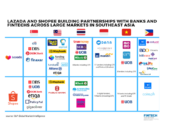
Singapore’s Digital Banking License Race Intensifies With Deadline Looming in Weeks
by Fintech News Singapore December 10, 2019In Singapore, the end-of-year deadline to apply for a digital banking license is coming up, and tech companies, banks and brokerages are racing to form partnerships to meet regulators’ stiff requirements.
Singapore will be issuing up to two retail and three wholesale digital banking licenses in a move aimed at boosting competition and innovation in an industry dominated by traditional players such as DBS Group, Oversea-Chinese Banking Corp (OCBC) and United Overseas Bank (UOB).
The new digital banking licenses are intended to open up the sector to online-only challenger banks that can operate at lower costs and hence offer more competitive products and services.
But Singapore regulators are demanding stringent requirements including S$1.5 billion in paid-in capital for retail banks. In addition, applicants must be headquartered in Singapore and have to be majorly controlled by Singapore nationals. This implies that most bidders have to team up to meet the entry conditions by combining banking know-how, technology expertise and deep pockets.
Sources told Reuters that about three dozens companies are currently in talks to forms consortia, and several are in last-minute negotiations.
Ride-hailing giant Grab, Standard Chartered, Singtel, Razer, and a consortium that includes Singapore’s V3 the company behind the massage chair brand OSIM, are all interested in the licenses.
The new digital banking license has also caught the attention of players who have secured similar licensing in Hong Kong. To date Ant Financial, Ping An and AMTD have all expressed interested to bid for the license in Singapore.
OCBC’s chief executive Samuel Tsien told Bloomberg in November that the firm may also join the race both as a bank and through its insurance arm, Great Eastern Holdings.
The goal here would be to use the Singapore digital banking license as a stepping stone to expand across the broader Southeast Asian region. “The major driving factor is not the banking business,” he said. “It’s the franchise of the customers of that consortium and we want to tap that.”
Tsien said the bank may join one of the consortia led by non-banks seeking a digital banking license. “We are talking to various parties but we have not made a final decision whether we would go in or not,” he said.
OCBC has reportedly agreed in principle to join a group led by peer-to-peer lender Validus Capital and Temasek’s venture capital arm to apply for a wholesale digital banking license. Prior to this, it was also reported that OCBC was exploring to jointly bid for a digital banking license with Singtel.
Great Eastern Holdings may also join a consortium should a non-bank offer the change to expand its customer base, Tsien said.
Brokerages join the race
Most recently, news broke that several brokerages from Singapore are also preparing to apply for digital bank licenses. But like the others, they will likely have to form consortia.
PhillipCapital and iFAST Corporate, two providers of securities trading platforms in Singapore, told Nikkei Asian Review they want to add banking services into their offerings as a way to protect their business models from traditional banks and fence off the increased pressure coming from western competitors like Interactive Brokers and Robinhood entering the market.
Luke Lim, managing director of Phillip Securities, the retail broking arm of PhillipCapital, told the news outlet that while PhillipCapital is willing to be the anchor applicant for a wholesale digital banking license, the company would prefer joining a consortium in which another company took the lead role, considering the high capital requirements needed to fully service retail consumers.
Lim Chung Chun, chief executive of iFAST, a wealth management fintech, said the company is on track in applying for a wholesale digital banking license, and is looking to being the anchor applicant in a consortium, along with two or three other partners.
But with so many companies looking to tap into Singapore’s digital banking opportunity, securing a license will be a daunting task, and according to Thilan Wickramasinghe, an analyst at Maybank Kim Eng, consortiums with a strong regional presence, access to customer behavioral data and with expertise in cutting edge technologies such as artificial intelligence (AI) will likely be the ones ending up winning the licenses.
Singapore is set to announce the recipients of the five digital banking licenses in mid-2020.
Retail banks will be able to accept deposits from and offer services to retail and non-retail customers, while wholesale banks will mainly serve small and medium-sized enterprises (SMEs).
The new digital banks are expected to begin operations in a phased manner from mid-2021.
Featured image credit: Unsplash





